From the Chicago Reader (April 1, 1990). — J.R.
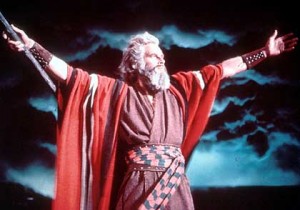
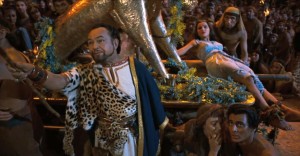
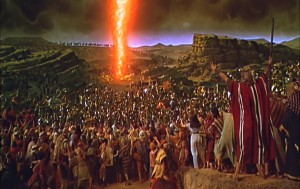
With a running time of nearly four hours, Cecil B. De Mille’s last feature and most extravagant blockbuster is full of the absurdities and vulgarities one expects, but it isn’t boring for a minute. Although it’s inferior in some respects to De Mille’s 1923 picture of the same title (which used the story of Moses as an extended prologue to a contemporary tale) and some of the special effects look less plausible now than they did in 1956, the color is ravishing, and De Mille’s form of showmanship, which includes a personal introduction and his own narration, never falters. Simultaneously ludicrous and splendid, this is an epic driven by the sort of personal conviction one almost never finds in more recent Hollywood monoliths. With Charlton Heston, Yul Brynner, Anne Baxter, Edward G. Robinson, Yvonne De Carlo, Debra Paget, John Derek, Cedric Hardwicke, H.B. Warner, Judith Anderson, Vincent Price, John Carradine, and many other familiar faces, including Woody Strode as the king of Ethiopia. 220 min. (JR)
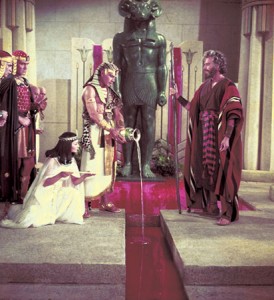
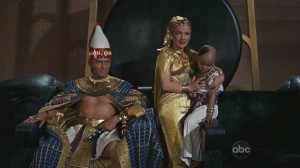 Read more
Read more
From the Chicago Reader (October 1, 1989). This lovely and sexy film is available on Twilight Time, with lots of extras (including deleted scenes and two separate audio commentaries). — J.R.
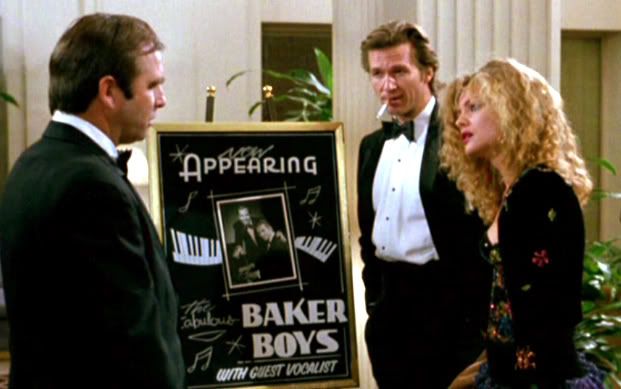
Real-life brothers Jeff and Beau Bridges play Jack and Frank Baker, a second-rate cocktail-lounge piano duo with staying power who hire sexy vocalist Susie Diamond (Michelle Pfeiffer) to strengthen their act, in the impressive 1989 directorial debut of screenwriter Steve Kloves (Racing With the Moon), who also wrote the script. Frank is the square brother who handles the business; he’s married, with kids, and not very musically inspired. Jack is remote, relatively irresponsible, and gifted; he plays jazz in his spare time and sounds like a leaner version of Bill Evans (his piano solos are dubbed, for the most part expertly, by Dave Grusin, the film’s music director). Susie is a former call girl who brings some soul to the group, as well as some problems when she and Jack develop a mutual attraction. This pared-away comedy-drama, which concentrates exclusively on the three characters, has plenty of old-fashioned virtues: deft acting, a nice sense of scale that makes the drama agreeably life-size, a good use of Seattle locations, fluid camera work (by Michael Ballhaus), a kind of burnished romanticism about the music, and a genuine feeling for the characters and their various means of coping. Read more
From the Chicago Reader (October 1, 1989). — J.R.
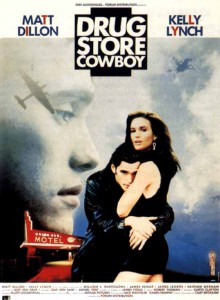
This amiable, no-nonsense account of a quartet of Portland, Oregon, junkies in 1971 fully lives up to the promise of Mala Noche, director Gus Van Sant’s previous feature. Adapted by Van Sant and Daniel Yost from an unpublished autobiographical novel by James Fogle, this 1989 feature has the kind of stylistic conviction that immediately wins one over; it conveys something of a junkie’s inner life with its editing rhythms, unorthodox use of sudden close-ups, hallucinatory passages, and Matt Dillon’s offscreen narration, and it documents the outer necessities of the lifestyle (including many drugstore robberies and changes of address). The characters are all quirky and life-size (the Dillon character’s superstitiousness is one of the principal motors of the plot, and the story’s outcome doesn’t prove him wrong), and like Bill Forsyth’s handling of the burglaries in Breaking In, Van Sant’s treatment of drugs is refreshingly free of either moralizing or romanticizing. It’s one indication of his ease and assurance that he successfully integrates the persona of William S. Burroughs into a fiction film: all the actors are used expertly, but it’s Burroughs, cropping up near the end, who articulates the film’s sociopolitical moral in a contemporary context. Read more







